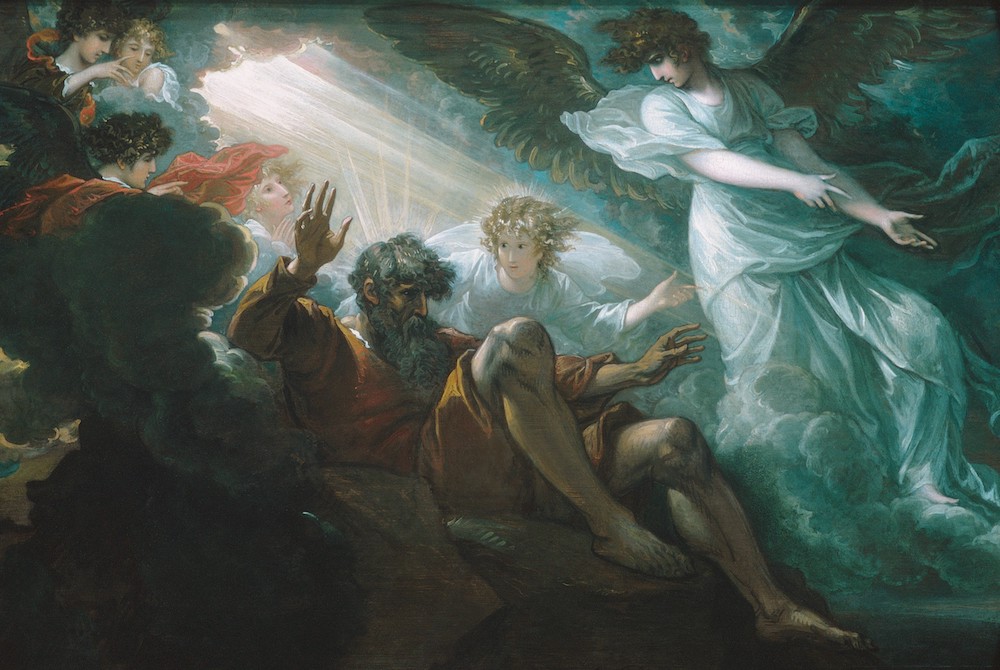
Detail of painting by Benjamin West, "Moses Shown the Promised Land," 1801 (Metropolitan Museum of Art)
Both the Judaic and the Christian traditions use the number 40 to signify a lengthy period of time, a time when something significant happens or a time of waiting for something significant to happen.
The Jews were exiled from the Promised Land for 40 years. When Moses lived in Egypt, the people came to him for guidance and mediation, and he instructed them in matters of law and what we call now "politics." When he left Egypt, he and his people came to the wilderness of Sinai, and there, after a period of some 40 years, Moses was summoned by God to climb to the mountaintop, and God spoke to Moses. Moses again was the mediator between the people and God. Moses was the politician who taught them how to live in a polis, a community where one cared for the other.
Forty days continued to represent this kind of anticipation among the people, a period of waiting for a visitation, a pronouncement, a message, a leader to deliver the people from slavery or oppression or to encourage them to move forward in their pilgrimage, to repent of their sins, to look for a greater good, to live better lives, to form a community, to climb the mountain.
We see this not only in the 40 years the Jews spent wandering in the wilderness, but also in the story of Noah's flood, which lasted 40 days, and in the story of Elijah, who fasted 40 days and 40 nights before the Lord came and sent him on his mission.
In the New Testament, 40 days continued to represent a period of trial and anticipation. Jesus spent 40 days fasting in the desert, where the devil tempted him to no avail. The Christian church fasts for 40 days during Lent, celebrates the Easter Resurrection, and then 40 days later, the Ascension.
Advertisement
Muhammad was 40 years old when the Angel Gabriel visited him and revealed his mission to him. The number 40 is significant in several other religions as well.
All of this came to mind as I read an email that reminded me that it is about 40 days until our official national Election Day. The pre-election season seems always to be upon us anyway, but this year, more than others, it is more resonant and significant because of the crises of faith, justice, civility and morality that we face.
I am wondering, then, how to deal with these last days, as it were, before the presidential election of 2020. Should I fast for 40 days? Should I go back to Conley Fork in eastern Kentucky where we built a house a long time ago and climb the hill behind the house and look out over the fall colors emerging on that landscape and call upon the Lord to deliver a new tablet of commandments? Should I wander the streets of my local community and beg people to vote? Should I pray every minute of every day for collective wisdom and justice? Should I hide in my small space and bewail the misery, anger and violence that have been and are occurring? Should I love my neighbor as myself and work toward the common good? Should I rely on grace and faith and goodness?
I would love to get a tablet with 10 clear statements, admonitions and directions, but just in case the tablet doesn't make it in time, what can I do during the next 40 days? What can we do? I recommend prayer, personal influence and focused action.
First of all, we must pray. For me that means going to the Psalms first, which speak to me of the eternal human condition. We are weak and sinful and the enemy approaches, but we appeal to the Lord and the Lord hears our cry. For many of us, this time is like no other and is worse than ever in human history. The Psalms convince me, however, that we are like all others before us and we must trust in God. "O God, thou art my God, I seek thee early with a heart that thirsts for thee and a body wasted for longing for thee. … and whoever swears by God's name shall exult; the voice of falsehood shall be silenced" (Psalm 63: 1-2; 11).
Forty days give us time to work as well as pray. I suggest the John Henry Newman model of personal influence, communicating with those of like minds. Newman argued that personal influence, the way Jesus taught his small group of disciples, and the way they each then talked to their own circle of personal contacts, and the way the circles spread out, was how the early church community was formed and grew. We each have a circle; why not expand it and focus on working together for justice and good?
Our actions will follow from prayer and personal or interpersonal relationships. We may become more overtly political and work to ensure a fair and open election process; we may write letters, work at the polls, join action groups or find another way to put our prayer into actions that work toward good. Catholics and indeed all Christians today are being labeled and categorized. Politics and religion are entangled in the current election in a way that is destructive to an extent not seen before. We can change this and we can work to clarify issues and realities, especially as they relate to belief and practice. We can spend our 40 days seeking and promoting truth, justice, equality and charity. We can all become Moses-style politicians.
[Carole Ganim, Ph.D., a former Ursuline sister and longtime English professor, author of Being Out of Order: The Prophetic Generation of Nuns and Sisters, writes about literature, women and life.]




